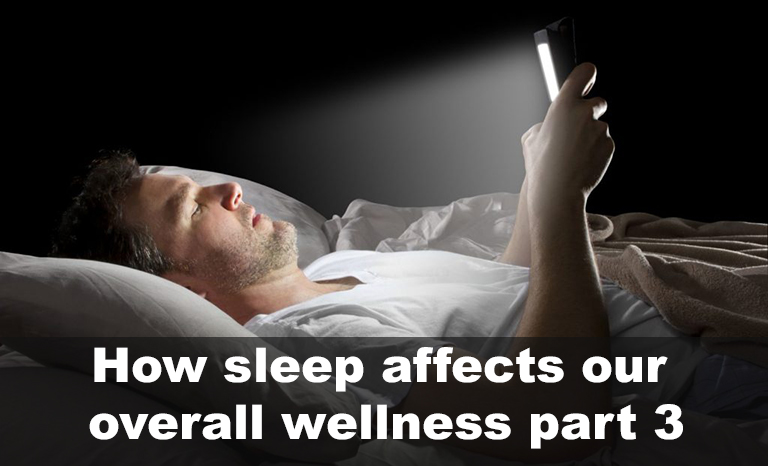
15 May How sleep affects our overall wellness part 3
How sleep affects our overall wellness part 3
Blue light has a dark side
On week 20 we would like to continue our series on sleep. Part three has to do with the effects of blue light on our bodies and our sleeping patterns induced by all the electronic devices in our modern lives. We have added blue light filters on all our electronic devices to help curb the many challenges that arise from exposure to blue light. All of us here at I-RAMA appreciate all the shares, likes, and follows. Thank you for all your support from all of us.
According to http://www.health.harvard.edu/staying-healthy/blue-light-has-a-dark-side
Light at night is bad for your health, and exposure to blue light emitted by electronics and energy-efficient light bulbs may be especially so.
Until the advent of artificial lighting, the sun was the major source of lighting, and people spent their evenings in (relative) darkness. Now, in much of the world, evenings are illuminated, and we take our easy access to all those lumens pretty much for granted.
But we may be paying a price for basking in all that light. At night, light throws the body’s biological clock—the circadian rhythm—out of whack. Sleep suffers.
But not all colors of light have the same effect. Blue wavelengths—which are beneficial during daylight hours because they boost attention, reaction times, and mood—seem to be the most disruptive at night. And the proliferation of electronics with screens, as well as energy-efficient lighting, is increasing our exposure to blue wavelengths, especially after sundown.
Daily rhythms influenced by light
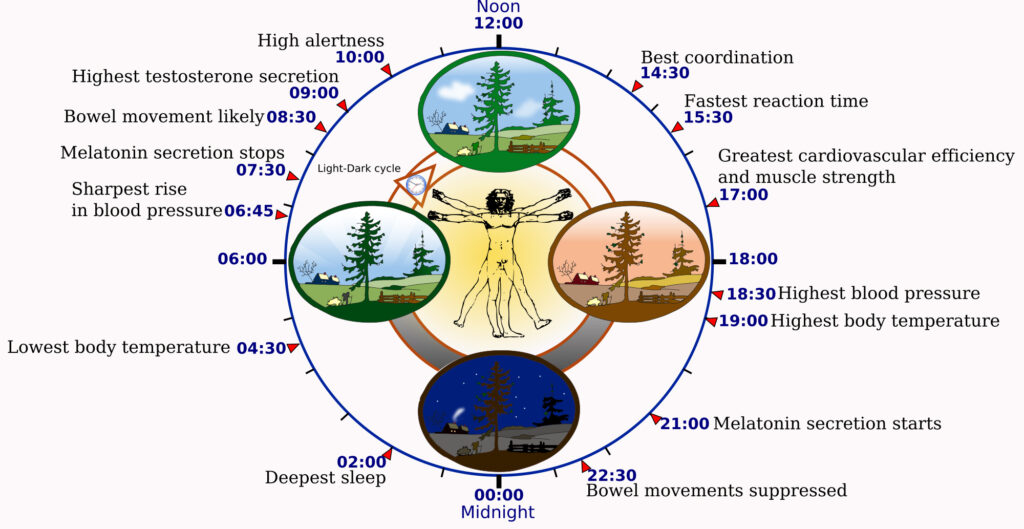 Everyone has slightly different circadian rhythms, but the average length is 24 and one-quarter hours. The circadian rhythm of people who stay up late is slightly longer, while the rhythms of earlier birds fall short of 24 hours. Dr. Charles Czeisler of Harvard Medical School showed, in 1981, that daylight keeps a person’s internal clock aligned with the environment.
Everyone has slightly different circadian rhythms, but the average length is 24 and one-quarter hours. The circadian rhythm of people who stay up late is slightly longer, while the rhythms of earlier birds fall short of 24 hours. Dr. Charles Czeisler of Harvard Medical School showed, in 1981, that daylight keeps a person’s internal clock aligned with the environment.
HOW BLUE LIGHT AFFECTS KIDS & SLEEP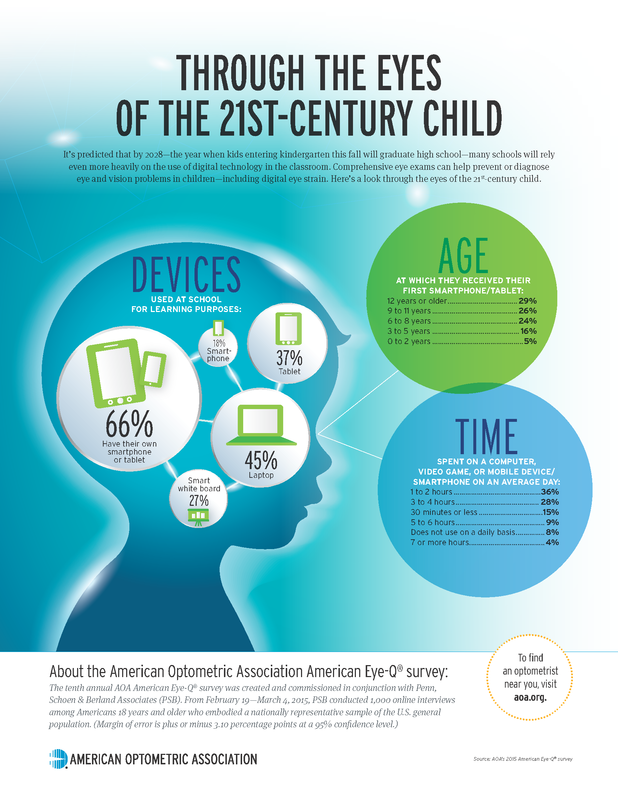
As challenging as it is to get kids to stop watching TV or using their electronic devices before they go to bed or even during their bedtime, there’s a compelling reason to make it happen. The blue light that’s emitted from these screens can delay the release of sleep-inducing melatonin, increase alertness, and reset the body’s internal clock (or circadian rhythm ) to a later schedule. This is a big issue for teens whose circadian rhythms are already shifting naturally, causing them to feel awake later at night. The end result: sleep-deprived or poorly rested kids who have essentially given themselves a mini case of Jet Lag.
The reason that blue light is so problematic is that it has a short wavelength that affects levels of melatonin more than any other wavelength does. Light from fluorescent bulbs and LED lights can produce the same effect. Normally, the pineal gland in the brain begins to release melatonin a couple of hours before bedtime, and melatonin reaches its peak in the middle of the night. When people read on a blue light-emitting device (like a tablet, rather than from a printed book) in the evening, it takes them longer to fall asleep; plus, they tend to have less REM sleep (when dreams occur) and wake up feeling sleepier— even after eight hours of shuteye.
Consider these effects good reasons to impose a digital curfew on your kids. Have them power down their electronics, including the TV, an hour or two before bedtime so their bodies can start producing more melatonin. If that’s just not possible—if they’re madly finishing their homework on a computer, for instance—it helps to dim the brightness on the screen. Or, you can install an app that automatically warms up the colors on the screen—away from blues and toward reds and yellows—at sunset. Also, avoid using energy-efficient (blue) bulbs in nightlights in bedrooms and bathrooms; opt for dim red lights instead because red light has a higher wavelength and does not suppress the release of melatonin.
The trials and tribulations of nighttime light
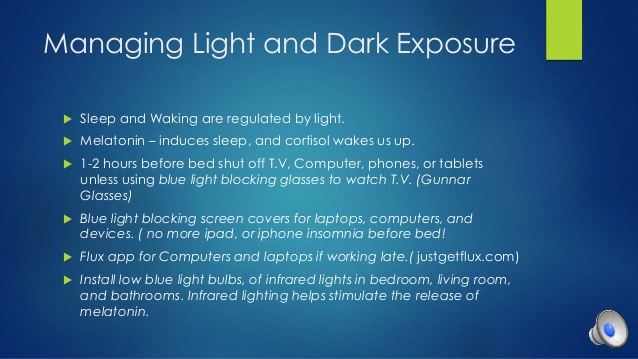 According to Harvard Studies
According to Harvard Studies
It’s not exactly clear why nighttime light exposure seems to be so bad for us. But we do know that exposure to light suppresses the secretion of melatonin, a hormone that influences circadian rhythms, and there’s some experimental evidence (it’s very preliminary) that lower melatonin levels might explain the association with cancer.
A Harvard study shed a little bit of light on the possible connection to diabetes and possibly obesity. The researchers put 10 people on a schedule that gradually shifted the timing of their circadian rhythms. Their blood sugar levels increased, throwing them into a prediabetic state, and levels of leptin, a hormone that leaves people feeling full after a meal, went down.
Even dim light can interfere with a person’s circadian rhythm and melatonin secretion. A mere eight lux—a level of brightness exceeded by most table lamps and about twice that of a night light—has an effect, notes Stephen Lockley, a Harvard sleep researcher. Light at night is part of the reason so many people don’t get enough sleep, says Lockley, and researchers have linked short sleep to increased risk for depression, as well as diabetes and cardiovascular problems.
The power of the blues
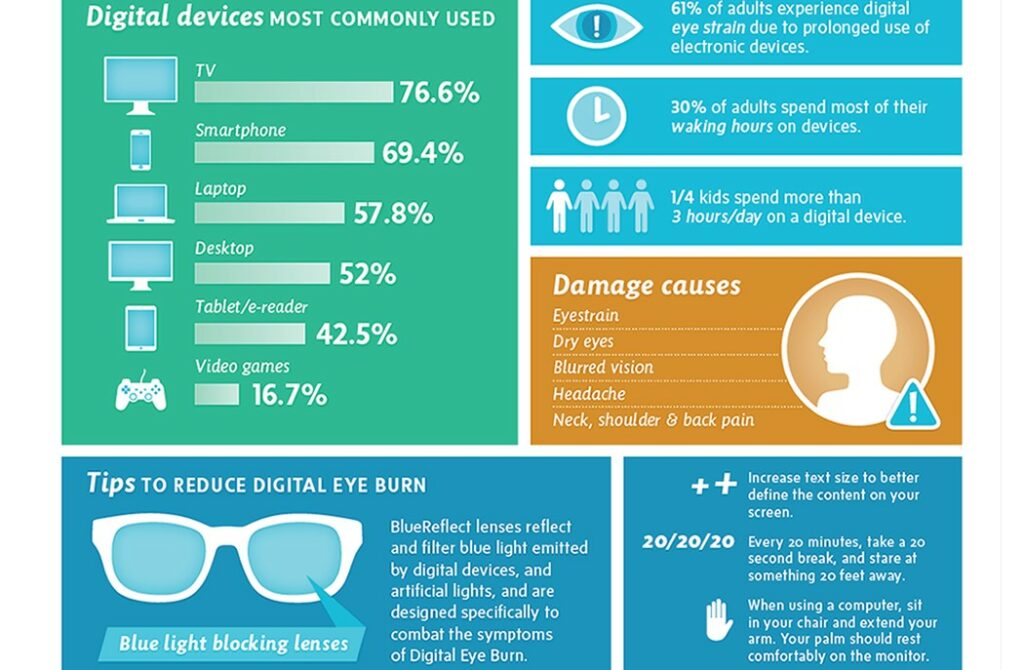 While the light of any kind can suppress the secretion of melatonin, blue light does so more powerfully. Harvard researchers and their colleagues conducted an experiment comparing the effects of 6.5 hours of exposure to blue light to exposure to green light of comparable brightness. The blue light suppressed melatonin for about twice as long as the green light and shifted circadian rhythms by twice as much (3 hours vs. 1.5 hours).
While the light of any kind can suppress the secretion of melatonin, blue light does so more powerfully. Harvard researchers and their colleagues conducted an experiment comparing the effects of 6.5 hours of exposure to blue light to exposure to green light of comparable brightness. The blue light suppressed melatonin for about twice as long as the green light and shifted circadian rhythms by twice as much (3 hours vs. 1.5 hours).
In another study of blue light, researchers at the University of Toronto compared the melatonin levels of people exposed to bright indoor light who were wearing blue-light–blocking goggles to people exposed to regular dim light without wearing goggles. The fact that the levels of the hormone were about the same in the two groups strengthens the hypothesis that blue light is a potent suppressor of melatonin. It also suggests that shift workers and night owls could perhaps protect themselves if they wore eyewear that blocks blue light. Inexpensive sunglasses with orange-tinted lenses block blue light, but they also block other colors, so they’re not suitable for use indoors at night. Glasses that block out only blue light can cost up to $80.
Less-blue light
If blue light does have adverse health effects, then environmental concerns and the quest for energy-efficient lighting could be at odds with personal health. Those curlicue compact fluorescent light bulbs and LED lights are much more energy-efficient than the old-fashioned incandescent light bulbs we grew up with. But they also tend to produce more blue light.
The physics of fluorescent lights can’t be changed, but coatings inside the bulbs can be so they produce a warmer, less blue light. LED lights are more efficient than fluorescent lights, but they also produce a fair amount of light in the blue spectrum. Richard Hansler, a light researcher at John Carroll University in Cleveland, notes that ordinary incandescent lights also produce some blue light, although less than most fluorescent light bulbs.
What you can do
Use dim red lights for night lights. Red light has the least power to shift circadian rhythm and suppress melatonin.
Avoid looking at bright screens beginning two to three hours before bed.
If you work a night shift or use a lot of electronic devices at night, consider wearing blue-blocking glasses.
Expose yourself to lots of bright light during the day, which will boost your ability to sleep at night, as well as your mood and alertness during daylight.
What Happens in Your Body When You’re Sleep Deprived?
By Dr. Mercola According to http://articles.mercola.com/sites/articles/archive/2016/03/03/sleep-deprivation-effects.aspx
Lack of sleep has many ramifications, from minor to major, depending on your accumulated sleep debt. Short term, lack of sleep tends to have an immediate effect on your mental and emotional states.
Over the long term, poor sleep can contribute to a whole host of chronic health problems, from obesity and diabetes to immune problems and an increased risk for cancer. Plus it raises your risk of accidents and occupational errors.
Unfortunately, few are those who sleep well on a regular basis. Part of the problem is our propensity for using artificial lighting and electronics at night, in combination with getting insufficient exposure to full, bright, and natural sunlight during the day.
This disconnect from the natural cycles of day and night, activity and sleep, can turn into a chronic problem where you’re constantly struggling to sleep well.
Fortunately, the remedy is simple, and if you follow the recommendations at the end of this article, chances are you’ll be able to re-establish a healthy sleep pattern, without which you simply cannot be optimally healthy — even if you do everything else right.
A Single Night Without Sleep Can Have Severe Implications
As shown in the video above, going just one night without proper sleep starts to impair your physical movements and mental focus, comparable to having a blood alcohol level of 0.10 percent.
In essence, if you haven’t slept, your level of impairment is on par with someone who’s drunk.
According to researchers, 24 hours’ worth of sleeplessness breaks down cognitive faculties to such a degree that you’ll be 4.5 times more likely to sign a false confession.
Overall, you become more susceptible to “suggested” memories and start having trouble discerning the true source of your memories. For example, you might confuse something you read somewhere with a first-hand experience. According to the authors of this study:
“We propose that sleep deprivation sets the stage for a false confession by impairing complex decision-making abilities — specifically, the ability to anticipate risks and consequences, inhibit behavioral impulses, and resist suggestive influences.”
Lack of Sleep Linked to Internet Surfing and Poor Grades
Other research has linked lack of sleep to more extended internet usage, such as browsing through Facebook rather than studying or working. The reason for this is again related to impaired cognition and the inability to focus, making you more prone to distraction.
Not surprisingly, academic performance also suffers. In one recent study, the less sleep high school students reported getting, the lower their average grades were.
How Sleep Influences and Regulates Emotional Perception
Sleeping well is also important for maintaining emotional balance. Fatigue compromises your brain’s ability to regulate emotions, making you more prone to crankiness, anxiety, and unwarranted emotional outbursts.
Recent research also shows that when you haven’t slept well, you’re more apt to overreact to neutral events; you may feel provoked when no provocation actually exists, and you may lose your ability to sort out the unimportant from the important, which can result in bias and poor judgment.
Reporting on this research, in which participants were kept awake for one whole night before taking a series of image tests to gauge emotional reactions and concentration levels, Medical News Today writes:
“… Eti Ben-Simon, who conducted the experiment, believes that sleep deprivation may universally impair judgment, but it is more likely that a lack of sleep causes neutral images to provoke an emotional response.
The second test examined concentration levels. Participants inside a fMRI scanner had to complete a task that demanded their attention to press a key or button while ignoring distracting background pictures with emotional or neutral content …
After only one night without sleep, participants were distracted by every single image (neutral and emotional), while well-rested participants only found the emotional images distracting.
The effect was indicated by activity change, or what Prof. Hendler calls ‘a change in the emotional specificity’ of the amygdala … a major limbic node responsible for emotional processing in the brain.”
What Happens in Your Body After Two or More Sleepless Nights?
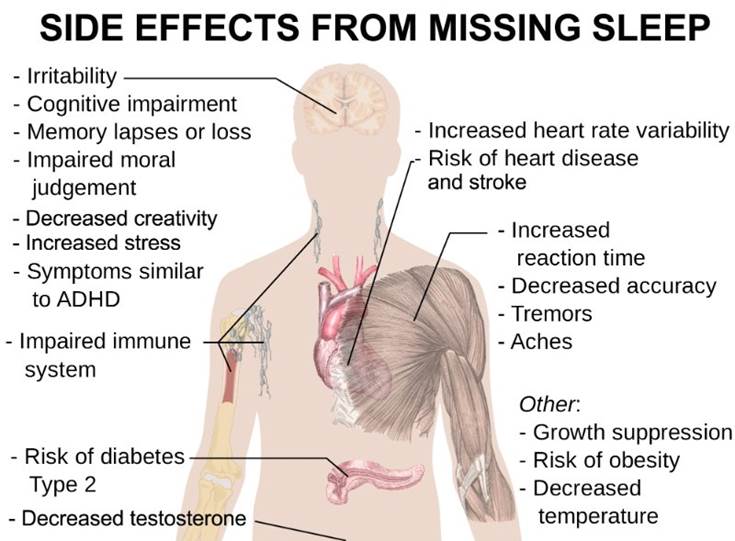 After 48 hours of no sleep, your oxygen intake is lessened and anaerobic power is impaired, which affects your athletic potential. You may also lose coordination, and start to forget words when speaking. It’s all downhill from there.
After 48 hours of no sleep, your oxygen intake is lessened and anaerobic power is impaired, which affects your athletic potential. You may also lose coordination, and start to forget words when speaking. It’s all downhill from there.
After the 72 hour mark of no sleep, concentration takes a major hit, and emotional agitation and heart rate increases. Your chances of falling asleep during the day increase and along with it, your risk of having an accident.
In 2013, drowsy drivers caused 72,000 car accidents in which 800 Americans were killed, and 44,000 were injured. Your problem-solving skills dwindle with each passing sleepless night, and paranoia can become a problem.
In some cases, hallucinations and sleep deprivation psychosis can set in — a condition in which you can no longer interpret reality. Recent research suggests psychosis can occur after as little as 24 hours without sleep, effectively mimicking symptoms observed in those with schizophrenia.
Sleep Deprivation Decreases Your Immune Function
Research published in the journal Sleep reports that sleep deprivation has the same effect on your immune system as physical stress.
The researchers measured the white blood cell counts in 15 people who stayed awake for 29 hours straight and found that blood cell counts increased during the sleep deprivation phase. This is the same type of response you typically see when you’re sick or stressed.
In a nutshell, whether you’re physically stressed, sick, or sleep-deprived, your immune system becomes hyperactive and starts producing white blood cells — your body’s first line of defense against foreign invaders like infectious agents. Elevated levels of white blood cells are typically a sign of disease. So your body reacts to sleep deprivation in much the same way it reacts to illness.
Other study findings suggest that deep sleep plays a very special role in strengthening immunological memories of previously encountered pathogens in a way similar to psychological long-term memory retention. When you’re well rested, your immune system is able to mount a much faster and more effective response when an antigen is encountered a second time.
When you’re sleep-deprived, your body loses much of this rapid response ability. Unfortunately, sleep is one of the most overlooked factors of optimal health in general and immune function in particular.
Sleeping Poorly Raises Your Risk of Type 2 Diabetes
A number of studies have demonstrated that lack of sleep can play a significant role in insulin resistance and type 2 diabetes. In earlier research, women who slept five hours or less every night were 34 percent more likely to develop diabetes symptoms than women who slept for seven or eight hours each night.
According to research published in the Annals of Internal Medicine, after four nights of sleep deprivation (sleep time was only 4.5 hours per night), study participants’ insulin sensitivity was 16 percent lower, while their fat cells’ insulin sensitivity was 30 percent lower, and rivaled levels seen in those with diabetes or obesity.
Senior author Matthew Brady, Ph.D., an associate professor of Medicine at the University of Chicago, noted that: “This is the equivalent of metabolically aging someone 10 to 20 years just from four nights of partial sleep restriction. Fat cells need sleep, and when they don’t get enough sleep, they become metabolically groggy.”
Similarly, researchers warn that teenage boys who get too little slow-wave sleep are at increased risk of developing type 2 diabetes. Slow-wave sleep is a sleep stage associated with reduced levels of cortisol (a stress hormone) and reduced inflammation. As reported by MedicineNet.com:
“Boys who lost a greater amount of slow-wave sleep between childhood and the teen years had a higher risk of developing insulin resistance than those whose slow-wave sleep totals remained fairly stable over the years …
‘On a night following sleep deprivation, we’ll have significantly more slow-wave sleep to compensate for the loss,’ study author Jordan Gaines … said … ‘We also know that we lose slow-wave sleep most rapidly during early adolescence. Given the restorative role of slow-wave sleep, we weren’t surprised to find that metabolic and cognitive [mental] processes were affected during this developmental period.’”
The Many Health Hazards of Sleep Deprivation
Aside from directly impacting your immune function, another explanation for why poor sleep can have such varied detrimental effects on your health is that your circadian system “drives” the rhythms of biological activity at the cellular level. We’ve really only begun to uncover the biological processes that take place during sleep.
For example, during sleep, your brain cells shrink by about 60 percent, which allows for more efficient waste removal. This nightly detoxification of your brain appears to be very important for the prevention of dementia and Alzheimer’s disease. Sleep is also intricately tied to important hormone levels, including melatonin, the production of which is disturbed by a lack of sleep.
This is extremely problematic, as melatonin inhibits the proliferation of a wide range of cancer cell types, as well as triggers cancer cell apoptosis (self-destruction).
Natural Insomnia Solution by Dr. Andrew Weil
from: http://www.drweil.com/drw/u/ART02004/insomnia
Courtesy of Dr. Weil on Healthy Aging, Your Online Guide to the Anti-Inflammatory Diet.
Insomnia is a relatively common sleeping disorder, affecting about one-third of the adult population worldwide. Around 10 to 20 percent of adults with insomnia experience severe sleeplessness. Insomnia is more common in women, but the quality of sleep often decreases as we age, equally in both women and men. Although so-called insomnia cures are promoted widely, there are no guaranteed insomnia cures. There is, however, much that can be done to improve quality and duration of sleep.
In addition to having problems falling asleep at night, many people with insomnia may feel sleepy during the day, fall asleep during meetings or when they are watching a movie, have problems concentrating and remembering things, and feel irritable. Insomnia can also be marked by waking up frequently during the night and having difficulty falling back to sleep; by waking up too early in the morning; and by feeling unrefreshed following sleep.
During sleep, the body produces many important hormones and neurotransmitters, such as human growth hormone (HGH) and serotonin. Researchers are still exploring the long-term health implications of poor sleep, but immune function, memory, mental function, and mood can all be affected.
There are three classifications of insomnia:
1. Transient or short-term insomnia, which occurs infrequently (generally less than once a week).
2. Intermittent insomnia, which comes and goes, usually without a pattern.
3. Chronic insomnia, which is an ongoing problem that occurs most nights and lasts at least a month.
Causes and Symptoms
Many factors can contribute to insomnia, including stress. Others include:
Exposure to extreme temperature fluctuations or environmental noise
Disruption in sleep/wake patterns due to jet lag, work schedules, or other reasons
Side effects of medications
A change in the surrounding environment
Premenstrual syndrome, menstruation, pregnancy or menopause
For those suffering from chronic insomnia, the causes are usually more complex and result from a combination of factors, which can include:
Depression (the most common cause)
Chronic pain
Arthritis
Kidney disease
Restless leg syndrome
Heart failure
Parkinson’s disease
Sleep apnea
Asthma
In addition, there may be some behavioral reasons for chronic insomnia:
Anxiety about not being able to sleep
Drinking alcohol before bedtime
Consuming excessive amounts of caffeine
Smoking cigarettes before bedtime
Excessive napping in the afternoon or evening
Continually disrupted sleep/wake schedule possibly from work schedules or nighttime activities
The following are some of the best possible insomnia remedies:
Establish a consistent bedtime routine. This is one of the most important factors in insomnia treatment and maintaining good sleeping habits. Routines may include taking a warm bath or a relaxing walk in the evening or practicing meditation/relaxation exercises as part of your regular nighttime routine.
Try to go to bed at the same time every night, and get up at the same time each morning. This includes weekends.
Get plenty of exercise during the day. Studies have shown that people who are physically active sleep better than those who are sedentary. The more energy you expend during the day, the sleepier you will feel at bedtime. Just be sure not to engage in vigorous exercise too close to bedtime as that can make it more difficult to fall asleep.
Reduce your intake of caffeine, particularly in the evening.
Avoid stimulants like caffeine and limit alcohol. Both, even when consumed early in the day, can affect sleep and inhibit insomnia treatment.
Use your bed only for sleeping and sex. Don’t use it to do work or watch TV.
Avoid large meals late in the evening.
If you can’t fall asleep within half an hour of going to bed, get up and read or do something calming until you feel sleepy.
Learn and use a relaxation technique regularly. Breathing exercises, meditation, and yoga are not insomnia cures but do lead to a state conducive to sleep.
Use “white noise” devices to block out the surrounding environmental noise.
Take a hot bath before bedtime. Try a few drops of relaxing oil of lavender in the water.
Short naps are good. Try to get into the habit of napping for insomnia treatment: ten to twenty minutes in the afternoon, preferably lying down in a darkened room.
Spend some time outdoors as often as you can to get exposure to bright, natural light. If you are concerned about harmful effects of solar radiation, do it before ten in the morning or after three in the afternoon or use sunscreen.
Try to give yourself some time – up to an hour – in dim light before you go to sleep at night. Lower the lighting in your house and bedroom and if other members of the household object, wear sunglasses.
The two best natural sleep aids are valerian and melatonin. Valerian is a sedative herb, used for centuries. You can find standardized extracts in health food stores and pharmacies. Take one to two capsules a half hour before bedtime. Melatonin is a hormone that regulates the wake/sleep cycle and other daily biorhythms. Try sublingual tablets (to be placed under the tongue and allowed to dissolve); take 2.5 mg at bedtime as an occasional dose, making sure that your bedroom is completely dark. A much lower dose, 0.25 to 0.3 mg, is more effective for regular use.
Don’t obsess about not sleeping. Not surprisingly, studies have shown that individuals who worry about falling asleep have greater trouble dropping off. It may help to remind yourself that while sleeplessness is troublesome, it isn’t life-threatening and there are insomnia remedies.
Cyxus Blue Light Filter [Anti Eye Glare] Radiation Designer Reading Glasses, Better Sleeping Block UV Safety Classic Oval Plastic Yellow Lens
- Cyxus glasses can block 99% harmful blue light. Great for Computer or Cell Phone Readers
- Help protect your eyes from UV Blue rays, sunlight damage or anti-glare
- You can still enjoy your device from the comfort of your bed and get a restful deeper sleep
- All of our products have been authenticated by the authoritative institutes
- Have a timeless and fashionable look, allow you to enjoy a classic, vintage style
iLLumiShield – Apple MacBook Air 13″ (2013) (HD) Blue Light UV Filter Screen Protector
- This kit features 1x Blue Light screen protectors compatible with the Apple MacBook Air 13″ (2013) along with a set of instructions, installation squeegee, microfiber cleaning cloth and the iLLumiShield lifetime warranty.
- Designed with High-Quality PET film imported from Japan that consists of multiple layers. Each layer provides specific functions that allow the Blue Light line of screen protectors to outperform competitor products that use inferior materials and manufacturing processes.
- Blue Light technology deflects harmful blue-violet light & UV away from your eyes while allowing beneficial light to pass through.
- The Anti-bubble silicone resin layer is self-adhesive which allows for an easy dry installation – no more hassle of handling spray solution that could potentially leak into the ports of your device and do damage. For optimal effect, install in a lint-free environment.
- iLLumiShield Blue Light is a highly transparent, smooth and scratch resistant film that prevents bacterial elements, oil, and fingerprints.
Anti Blue Anti Radiation New Glass Screen Protector for iPhone 6/ 6s Plus Black Tempered Glass Filters EMF and Harmful Radiation and Blue Light
- Anti Blue Anti Radiation Glass Screen Protector For iPhone 6
- Cuts down exposure to the human body from cell phone radiation
- Prevent EMF damage from harmful rays
- Anti Radiation Screen Protector
- Retina dryness prevention
Premium Orthopedic Bamboo Memory Foam Pillow With Comfort Cooling Gel Technology (Queen Size) By Laniloha – Helps Relieve Neck Pain Improve Sleeping
- Cool and Refreshing To The Touch: Bamboo is 4 degrees cooler than cotton. Cooling gel inserts inside.
- Contains breathable cover made of bamboo viscose, inner pillow cover, cool gel insert, and solid core memory foam.
- Don’t Be Fooled By Lumpy Shredded Memory Foam Bamboo Pillows. That poke your head while you sleep!
- Instead, you want, a Solid Core Memory Foam that conforms and is smooth to your head’s shape.
- QUEEN SIZE. Shaped 23.5 *15 * 4.5 inches. Perfect for side and stomach sleepers.
Bamboo Pillow-Hotel Quality Pillow with Stay Cool Bamboo Cover-Fiber Filled in the USA-Hypoallergenic and Dust Mite Resistant-Relieves Snoring, Insomnia, Asthma, Neck Pain, TMJ, and Migraines
- Filled with Quality Poly Fiber in the USA
- Hypoallergenic & Dust Mite Resistant – Ultimate Luxury For ALL Sleep Positions
- Machine Washable
- Queen Pillow Measures: 20″ x 28″ King Pillow Measures: 20″ x 36″
